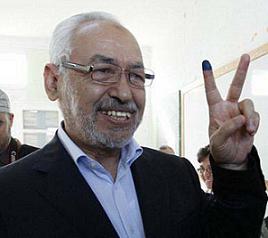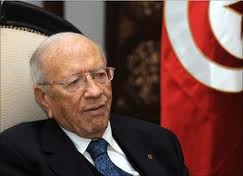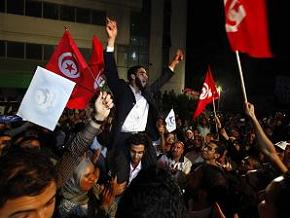Tunisian Islamic party, En-Nahda, was officially announced an the winner of elections with 41.5 per cent of votes cast, nine months following the popular uprising that ousted former President Zine Al-Abidine Ben Ali.
 |
| Shiekh Rachid al-Gannouchi |
Tunisian Islamic party, En-Nahda, was officially announced an the winner of elections with 41.5 per cent of votes cast, nine months following the popular uprising that ousted former President Zine Al-Abidine Ben Ali.
The party obtained 90 seats in a new 217-member assembly that will rewrite the constitution, appoint a president and form a caretaker government, elections chief Kamel Jendoubi announced in Tunis on Thursday.
The leftist Congress for the Republic (CPR) was in second place with 13.8 per cent, representing 30 seats, and Ettakatol third with 9.7 per cent or 21 seats, he said.
Following the declaration, En-Nahda announced it had started coalition negotiations and intended to form a new government within a month.
The party was banned under Ben Ali’s rule because of its religious identity, and its leader, Shiekh Rachid al-Gannouchi, was in exile. Following Ben Ali’s departure al-Gannouchi returned to Tunisia, and his movement registered as a political party in March.
On the poll victory al-Gannouchi said: "We will continue this revolution to realize its aims of a Tunisia that is free, independent, developing and prosperous in which the rights of God, the Prophet, women, men, the religious and the non-religious are assured because Tunisia is for everyone."
ELECTIONS PROTESTS
 |
| Popular List Loyalists claim election fraud |
Meanwhile, election officials had cancelled seats won by Areedha Chaabiya, or the Popular List, a party led by businessman Hachmi Hamdi, over alleged campaign finance violations.
The party loyalists took to streets angrily, protesting against the measure. In Sidi Bouzid, the town where the uprising that drove Ben Ali from power began, more than 2,000 young people marched on the headquarters of Ennahdha, burned tyres and pelted security forces with stones.
Protests spread to nearby Menzel Bouzayane where more than 1,000 people demonstrated, union official Mohamed Fadhel said. In Meknassy, 50km from Sidi Bouzid, demonstrators set fire to Ennahda's party office, Fadhel said.
COUNTRY’S RELIGIOUS IDENTITY
 |
| Cartaker PM, Beji Caid Sebsi |
On the other hand, analysts “fear” that En-Nahda would change somehow the identity of the country which has been ruled by seculars for more than three decades.
The interim Prime Minister, Beji Caid Sebsi, said that he had no reason to doubt En-nahdha's commitment to the secular state and democracy.
"I can't judge intentions. That's up to God," Sebsi told Egypt's al-Ahram daily.
"I can only judge by what's public and so far it's positive. At the end of the day, no one can come and change things completely,
"I think [En-nahdha] will rule intelligently and deal with reality. It is not necessarily a dark force. Tunisia will continue to move forward and not go against history."
Sebsi, a secularist technocrat who served in Ben Ali cabinets, has occupied the post of caretaker prime minister since March.
